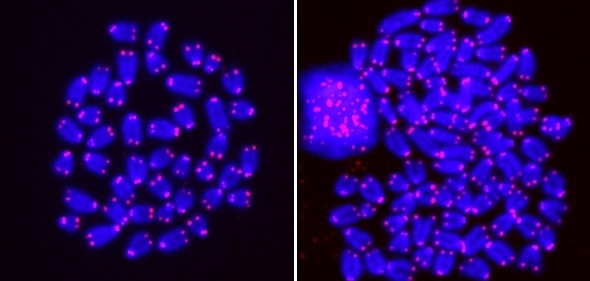Researchers from the Centre for Cancer Biology at the University of South Australia have found that a deficiency of the caspase-2 enzyme place people at a higher risk of developing tumours.

The right panel is an example of a caspase-2 deficient mouse tumour cell, which has an abnormal number of chromosomes.
Caspase-2 is an enzyme associated with apoptosis (cell death) that has now been found to target aneuploid cells, which often develop into tumours if not killed off.
Aneuploid cells have been dubbed the hallmark of cancer in about 90 per cent of solid tumours and 85 per cent of hematopoietic neoplasias.
Research leader at the University of South Australia Sharad Kumar discovered the caspase-2 enzyme nearly 25 years ago but has only just demonstrated its link to preventing tumours in recent years. He said understanding how tumours arise, spread and become drug resistant was critical to fighting cancer.
“Our work shows that caspase-2 is necessary and directly kills cells that have become aneuploid, so it is important to work out the mechanisms,” he said.
“Aneuploidy is a feature of the majority of human tumours and is known to lead to chromosomal instability that can promote cancer onset and progression and cause drug resistance.
“The idea is that if you can somehow activate caspase-2 in tumour cells that have become aneuploid then you should be able to kill them.”
Professor Kumar said the research mainly applied to blood cancers such as leukaemia or lymphoma but could also have serious implications for other types, including liver cancer.
In two recent publications, the team demonstrated that cells with a caspase-2 deficiency had weaker apoptosis, the process by which damaged cells are killed off.
Some cells that acquired DNA damage or chromosome defects during cell division, survived, due to a block in apoptosis. These surviving cells continued to grow and divide as aneuploid cells.
The research also showed that bone marrow cells from mice, which lacked caspase-2, accumulated many of these defective, potentially cancer-causing aneuploid cells with age.
“When we challenged mice with cancer causing agents, caspase-2 deficiency resulted in all animals developing tumours earlier. They were often more aggressive and developed drug resistance,” Professor Kumar said.
Key researcher Loretta Dorstyn said understanding this process was fundamental in cancer research and would help scientists search for new cancer therapies.
“Our research focuses on how damaged cells, with abnormal chromosomes, are removed,” she said.
“If a cell’s normal ‘stop growth’ and ‘cell death’ signals fail, this will allow damaged cells to survive and potentially become cancerous.”
The team's research on caspase-2 deficiency has been published in the journals Cell Death and Disease and Oncogene respectively.